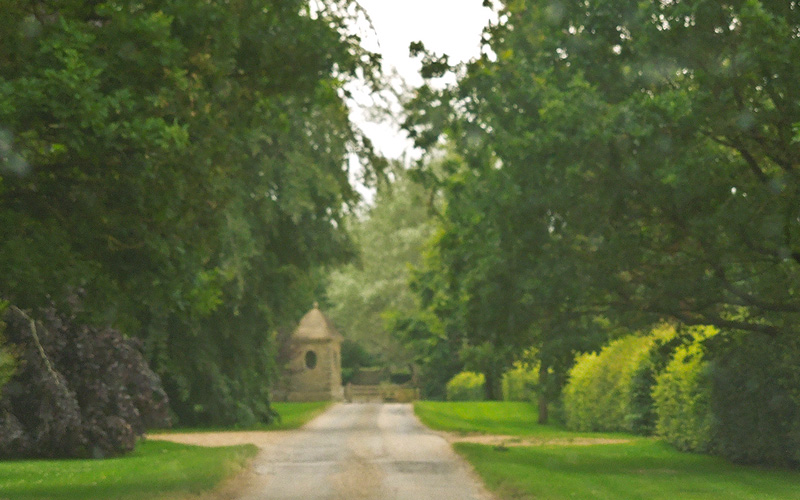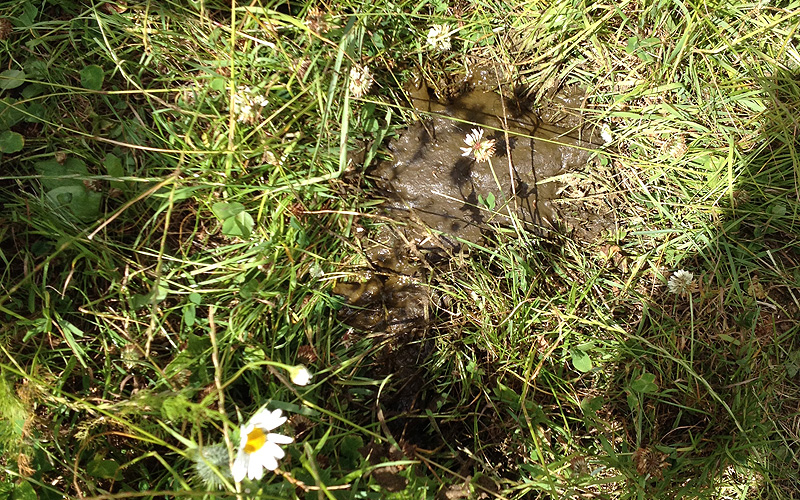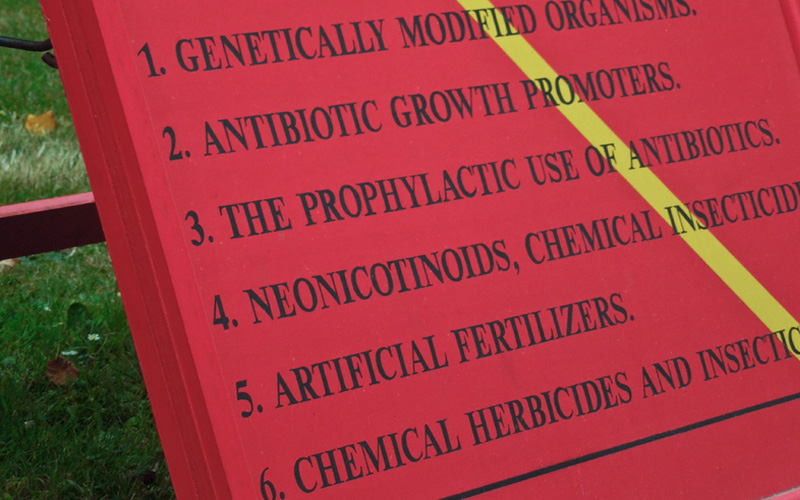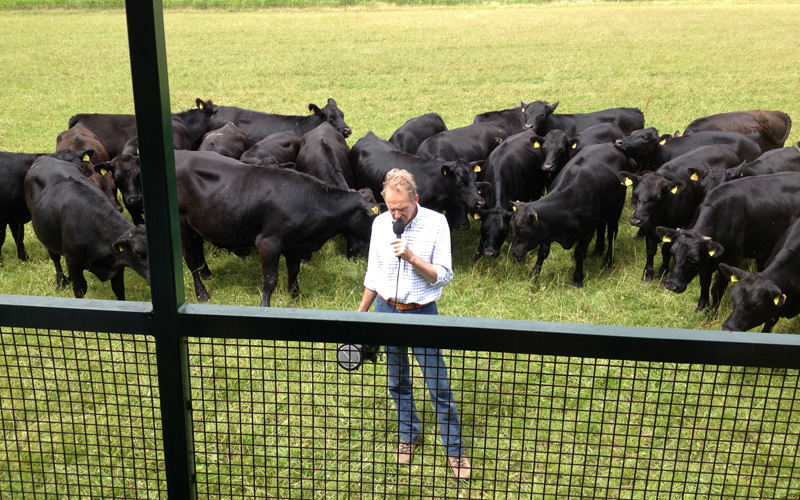
We were lost for twenty beautiful minutes in Tetbury, trying to find HRH’s driveway. A lovely one, though.
By guest blogger Peter Moore, VP/editor of Men’s Health
Very early on in my stroll through the enchanting organic gardens at Highgrove—the royal residence near Tetbury, England—I felt the eyes of Prince Charles upon me. And not just two pair of eyes: There were eight of them! In turn, those eyeballs were kindly, stern, engaging, quizzical—it was as if His Royal Highness was asking me, quite reasonably, “What are you doing in my sundial garden?”
I’d been wondering the same thing for about 24 hours, at that point.
But first, to clear up one possible point of confusion: It wasn’t actually Prince Charles who was staring me down. Rather, it was four busts of the next King of England, which had been presented to him as gifts. To which I say: If I ever become king, spare me the busts! I’d much prefer courtside tickets to the Chicago Bulls, thank you very much.
How do you react to a gift bust if you’re Prince Charles?
You can’t win. Either you look drunk with self-love: Hey, thanks for that really awesome bronze of myself! I look amazing! Or you’re a big ingrate/art hater: If I see another statue of my head I’m going to heave it into yon pond!
In fact, I found the quadra-bust garden to be a hilarious solution to the kind of problem only the Prince of Wales could have. He buried the redundant sculptures in deep alcoves in a really nice hedge, where they conveyed an amusing message to at least one Highgrove visitor: I’m watching you, so no selfies in the camera-prohibited zone.
And I didn’t take one, honest! (Especially because they confiscated our phones before the tour.)
But I was in fact rather humbled by the significance of what’s going on in two key locations in this princely region of England, about 100 miles west of London.
First, there’s Highgrove residence and garden, which have the looks and pedigree. They even have a royal air, what with the hundred-yard-long “thyme walk,” which, according to our guide, was personally planted by the prince himself. The idea: You stroll the path, crushing 20 varieties of the herb, and the fragrance wafts onto a higher plane. Thyme is quite literally on your side.
But then there’s the Prince’s nearby Duchy Farm, where the fragrances are a bit more primal and the stuff you crush with your boot heel is likely to stick there until you find a twig you can use to scrape it off. There are no busts of Prince Charles at Duchy Farm, but his presence is everywhere: in the hedgerows he plants to cordon off his sustainably cultivated fields, in the cattle he raises in a direct challenge to the meat-factory methodology so prevalent in the U.S., and in the all-organic cow pies that his bovines drop onto the pristine landscape. That way, American journalists can grind the nutrient-rich manure back into the pasture. By stepping in shit, per usual.
My pleasure, Your Royal Highness.

It looks like a cow pie to you. To Prince Charles and his team of sustainability savants, it’s nutrient- and microorganism-gold.
Why else was I there?
Because I was lucky enough to be there representing my employers at Rodale Inc., which for the past 85 years has been advancing the cause of healthy soil and the healthy food that comes from it. J.I. Rodale, this company’s founder, was also one of the founding fathers of the organic movement on our side of the Atlantic. In the 1930s, he researched the green counterrevolution then thriving in Great Britain and began applying its lessons in his own fields, as well as on his family’s dinner plates. Health ensued, both for the Rodale family and for the company that limned the lifestyle in Organic Gardening and Prevention magazines.
The bond between the British and American organic movements is strong, so it only makes sense that the bond between Duchy Farm and Rodale is strong, too. It just so happened that I was planning a trip near Highgrove/Duchy Farm last July, so Anthony Rodale—scion of the family and a Duchy insider—arranged my invite to join a group gathering there to assess the impact that agriculture and food systems are having on public health.

What not to bring to Highgrove House, Prince Charles’ residence in the Cotswolds. (And I didn’t, BTW.)
Not only is the King-in-Waiting a passionate advocate for sustainable farming, but he is also pals with people who are, well, outstanding in their fields—some of them literally, amidst crops and cows, and others figuratively, with government directorships and research institutes. These F.O.Cs (friends of Charles…duh) are figuring out how to feed us all responsibly, profitably, and deliciously—next year, and 50 years from now.
Add to that august group: me. As editor of Men’s Health magazine, I’m cowboying a herd of 23 million Men’s Health readers in 52 countries. You can see why they invited me there: If you want a mass movement demanding better food and better health, it will help if the MH millions want both of those things as well.
What did I learn that day that’s important for MH guys and for readers of this blog? A few things come to mind:
- If we can diminish the antibiotic overload currently being injected into livestock, we’ll all have a better shot (in the ass, probably) at being saved by human antibiotics when we really, really need them.
- If we can rely on natural systems to rid our crops of pests, we’ll have fewer endocrine disrupters (another term for pesticides, in this context) on the loose in the environment. What’s an endocrine disrupter? Oh, just a hormonally potent chemical that’s turning men into eunuchs, breast milk into toxic effluvia, and children into mutants. OK, maybe I overstated that, but maybe I understated it, too.
- It’ll give omnivores (like me) the last laugh, as it becomes clearer that the answer to sustainable food is for all of us to eat a wide variety of comestibles. A monoculture is as bad on your plate as it is in the environment. So you and I can have our steak, and eat it, too. That is, as long as we follow it up with a double helping of kale—which is delicious, grilled!
- Factory-farmed livestock are raised for yield, not taste. But what works in the feedlot is seldom satisfying on your fork. Well, fork that! A sustainable pig is a delicious pig. It’s a happier pig when it’s living, and it’s happier in your mouth when you’re chewing. Do yourself a flavor, and support that sustainable pig!
There are so many more stories to tell from my day down on the prince’s farm. Like how I found myself on a tractor, discussing the healing powers of organics with the former wife of a very famous rock star. Or how the farm manager head-faked a herd of 75 Black Angus cows into running the wrong way so that our group could escape their stampede.

David Wilson, farm manager at Duchy, standing before the bulls we were about to play a mean trick on.
In fact, it was a huge adventure just to hang out at Highgrove and at Duchy Farm, places where the world is being remade in a better way. By people who weren’t just pointing out disaster, they were proposing solutions—many of them edible.
I was sufficiently inspired that I might just commission a sculpture of Prince Charles. I’ll have it crafted out of butter. The sustainable scones that they serve in the Highgrove tearoom would taste great with a slather of environmentally responsible royal sweet cream and a spoonful of organic raspberry preserves.
To learn more about Prince Charles’ views on the food we eat the future we face, read The Prince’s Speech, available here: http://www.rodaleinc.com/products/books/princes-speech-future-food.

Peter Moore (pictured here with Lassie at The Today Show) is the editor of Men’s Health Magazine, host of the nationally syndicated radio show Men’s Health Live, and co-author of The 8-Hour Diet.




Am always amazed at what new things I learn here at Maria’s blog. I never knew any of this information about what is going on at the Prince’s Farm, and I am very impressed. And the fact that Rodale is involved and a part of it all, is the best part of all. The rest of the world needs to know what all other countries are doing to help give us a better life, a better planet and better food. This is the kind of news that needs to be spread around the world!